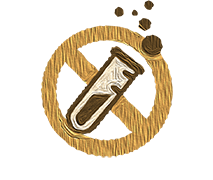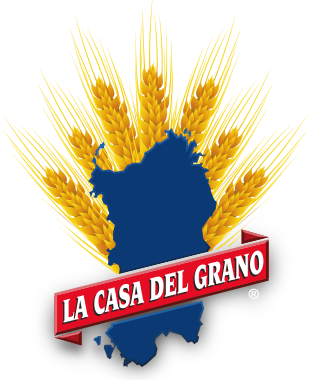Origin of wheat and quality control
THE SELECTION
We carefully select our durum wheat semolina, choosing only NON-GMO grains with a high protein index and ensuring optimal gluten levels, colour and flavour.


CHECKS
The semolina selected for subsequent processing and transformation into pasta undergoes continuous and strict testing before acceptance at the company:
- visual inspection upon arrival
- laboratory tests
- inspection of the finished, processed product at the pasta factory
- spot checks at the distribution points (after-sales)
NON-GMO
Our semolina and our pasta do not contain GMOs. The assurance of wholesome grains and excellent quality is supported by the traceability of the grains we purchase. By law, it is prohibited to cultivate genetically modified wheat in Italy, however, it can be imported provided the presence and percentage of GMOs are indicated on the label. Our labels speak loud and clear: only durum wheat semolina and water for traditional pasta, and whole durum wheat semolina for whole-wheat fregola and malloreddus.


NO ARTIFICIAL COLOURINGS
Our pasta contains no artificial colourings. The 4-flavours Malloreddus is coloured and flavoured using natural, dried raw materials: tomatoes, spinach and saffron. We use only the best local production to enrich our traditional pasta with Mediterranean flavours and aromas.
Certification
La Casa del Grano voluntarily adheres to various international certification processes, implementing procedures and controls that go above and beyond the strict standards already in place, guaranteeing the high quality of our products. The entire Casa del Grano organisation is subject to constant monitoring and regular inspections, aimed not only at achieving the highest quality, but also protecting the health of employees, the environment, and satisfying the customer.
ISO 9001:2008 Certification – Quality Management System
The Quality Management System concerns the proper organisation of various company processes to continuously improve performance, thus ensuring the continued quality of the products and services offered to Customers/Consumers. To this end, a series of internal procedures are in place to regulate the identified company processes.
ISO 14000:2004 Certification – Environmental certification
Environmental certification is a voluntary, self-control tool aimed at protecting the environment. The system allows the identification of potentially significant environmental issues and to improve performance in terms of energy savings and environmental impact. Regulatory compliance, performance monitoring and the prevention of possible environmental accidents, are ensured by this system.
British Retail Consortium Certification – BRC (Vers. 7 grade AA)
The BRC – Global Standard for Food Safety, developed in England in the late ’90s, covers the hygienic and health safety of food products. The system is articulated into several strict procedures used to constantly monitor the entire production process, from the raw material to the finished product, up until delivery to the customer.
International Food Standard – IFS (Vers. 6 higher level)
The IFS system is a standard specific to the food industry. Its operating procedures are aimed at qualifying the company’s suppliers and their ability to produce safe, quality products according to food hygiene and health legislation. The standards closely align with the BRC, expanding on HACCP guidelines. They focus in particular on adherence to hygiene and health standards, ensuring the traceability of both raw materials and finished products and implementing proactive measures to preserve the integrity of food.
SEDEX registered ethical company
La Casa del Grano is dedicated to promoting and upholding ethical principles, and has joined SEDEX with this in mind. SEDEX, a non-profit organisation, is committed to promoting ethical principles throughout global supply chains and stands as the largest platform in Europe for collecting and processing data on the ethical conduct of supply chains. The SEDEX methodology does not introduce a novel certification standard but rather offers a procedure (SMETA), that complements the practices commonly employed in audits by various Certifying Bodies, combining the most effective technical practices for evaluating social aspects, ensuring that outcomes align with ethical and social requirements.


